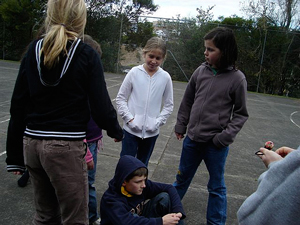
Source: Grandmother, Monica Anotelli, Flickr
In his memoir, Trying to Save Piggy Sneed, John Irving was about the same age as Harper Lee’s narrator, Scout Finch. Like Scout, he relays incidents from his childhood recalling how he and his Front Street friends played cruel pranks on the neighborhood “freak.” However, all the residents of Front Street were not so mean to the garbage collector. Each week when Irving’s grandmother came out to pay the odiferous Piggy Sneed, she greeted him and thoughtfully inquired about his pigs.
"It's nice to see you, Mr. Sneed," Grandmother would say--not flinching, not in the slightest, from his stench. "I hope the children aren't being rude to you," she'd say. "You don't have to tolerate any rudeness from them, you know," she would add. And then she'd pay him his money and peer through the wooden slats of the truck bed, where his pigs were savagely attacking the new garbage--and, occasionally, each other--and she'd say, "What beautiful pigs these are! Are these your own pigs, Mr. Sneed? Are they new pigs? Are these the same pigs as the other week?" But despite her enthusiasm for his pigs, she could never entice Piggy Sneed to answer her. He would stumble, and trip, and twist his way around her, barely able to contain his pleasure: that my grandmother clearly approved of his pigs, that she even appeared to approve (wholeheartedly!) of him. He would grunt softly to her.
While they are not as overtly cruel as Irving and his friends, the three children in Maycomb, Alabama, transform someone who had never harmed them into a frightful monster. Wiser voices in the novel, however, provide other perspectives for the reader as they caution the children about their summertime obsession with the man next door. One such wise voice is Atticus Finch, Jem and Scout’s father. When Jem pesters his father for information about their strange neighbors, Atticus tells him to “mind his own business and let the Radleys mind theirs." When the children don’t heed his advice, Atticus reminds them to stop tormenting Boo Radley by saying, “If he wanted to come out, he would. If he wanted to stay inside his own house he had the right to stay inside free from the attentions of inquisitive children."
Over the course of the novel, Jem and Scout Finch encounter real evil, but in the end they are rescued by a neighbor, one who has been lurking in the shadows, waiting to protect them from harm. In this clip of To Kill a Mockingbird, you’ll find out who that hero was.
Source: To Kill a Mockingbird (10/10) Movie CLIP - Scout Meets Boo Radley (1962) HD, MOVIECLIPS, YouTube
Text-to-Text Connections

Source: The bullies are warming up, Jo, Flickr
 In both of these literary works, the children use familiar and unflattering names when they refer to Boo Radley and Piggy Sneed. In marked contrast are the forms of address used by the adults. Using your notes, answer these questions.
In both of these literary works, the children use familiar and unflattering names when they refer to Boo Radley and Piggy Sneed. In marked contrast are the forms of address used by the adults. Using your notes, answer these questions.- How does Atticus Finch introduce Boo Radley to Scout?
- How does Irving’s grandmother address Piggy Sneed?
- What can you infer—or deduce—about the adults’ attitudes toward the outcasts based on the way they address them?
- He uses his title and full name, Mr. Arthur Radley.
- She calls him Mr. Sneed.
- They have much more of an understanding of the circumstances surrounding the outcasts and treat them with the respect they deserve.